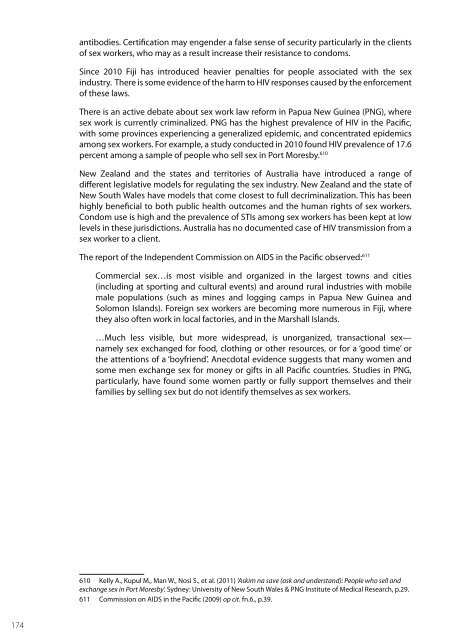SEX WORK AND THE LAW - HIV/AIDS Data Hub
SEX WORK AND THE LAW - HIV/AIDS Data Hub
SEX WORK AND THE LAW - HIV/AIDS Data Hub
You also want an ePaper? Increase the reach of your titles
YUMPU automatically turns print PDFs into web optimized ePapers that Google loves.
antibodies. Certification may engender a false sense of security particularly in the clients<br />
of sex workers, who may as a result increase their resistance to condoms.<br />
Since 2010 Fiji has introduced heavier penalties for people associated with the sex<br />
industry. There is some evidence of the harm to <strong>HIV</strong> responses caused by the enforcement<br />
of these laws.<br />
There is an active debate about sex work law reform in Papua New Guinea (PNG), where<br />
sex work is currently criminalized. PNG has the highest prevalence of <strong>HIV</strong> in the Pacific,<br />
with some provinces experiencing a generalized epidemic, and concentrated epidemics<br />
among sex workers. For example, a study conducted in 2010 found <strong>HIV</strong> prevalence of 17.6<br />
percent among a sample of people who sell sex in Port Moresby. 610<br />
New Zealand and the states and territories of Australia have introduced a range of<br />
different legislative models for regulating the sex industry. New Zealand and the state of<br />
New South Wales have models that come closest to full decriminalization. This has been<br />
highly beneficial to both public health outcomes and the human rights of sex workers.<br />
Condom use is high and the prevalence of STIs among sex workers has been kept at low<br />
levels in these jurisdictions. Australia has no documented case of <strong>HIV</strong> transmission from a<br />
sex worker to a client.<br />
The report of the Independent Commission on <strong>AIDS</strong> in the Pacific observed: 611<br />
Commercial sex…is most visible and organized in the largest towns and cities<br />
(including at sporting and cultural events) and around rural industries with mobile<br />
male populations (such as mines and logging camps in Papua New Guinea and<br />
Solomon Islands). Foreign sex workers are becoming more numerous in Fiji, where<br />
they also often work in local factories, and in the Marshall Islands.<br />
…Much less visible, but more widespread, is unorganized, transactional sex—<br />
namely sex exchanged for food, clothing or other resources, or for a ‘good time’ or<br />
the attentions of a ‘boyfriend’. Anecdotal evidence suggests that many women and<br />
some men exchange sex for money or gifts in all Pacific countries. Studies in PNG,<br />
particularly, have found some women partly or fully support themselves and their<br />
families by selling sex but do not identify themselves as sex workers.<br />
610 Kelly A., Kupul M., Man W., Nosi S., et al. (2011) 'Askim na save (ask and understand): People who sell and<br />
exchange sex in Port Moresby'. Sydney: University of New South Wales & PNG Institute of Medical Research, p.29.<br />
611 Commission on <strong>AIDS</strong> in the Pacific (2009) op cit. fn.6., p.39.<br />
174
















